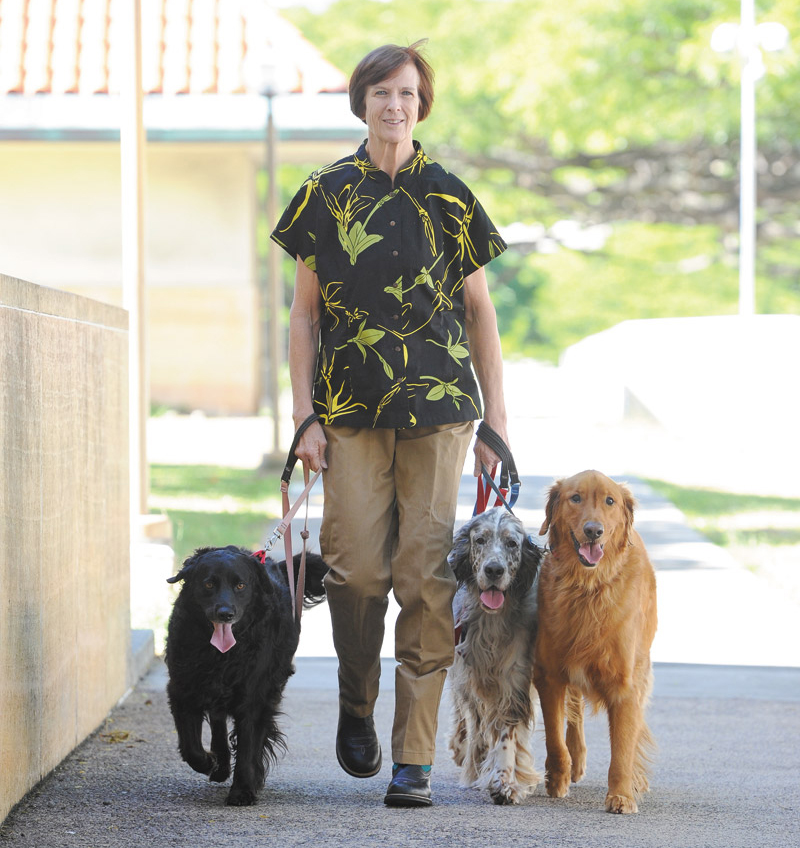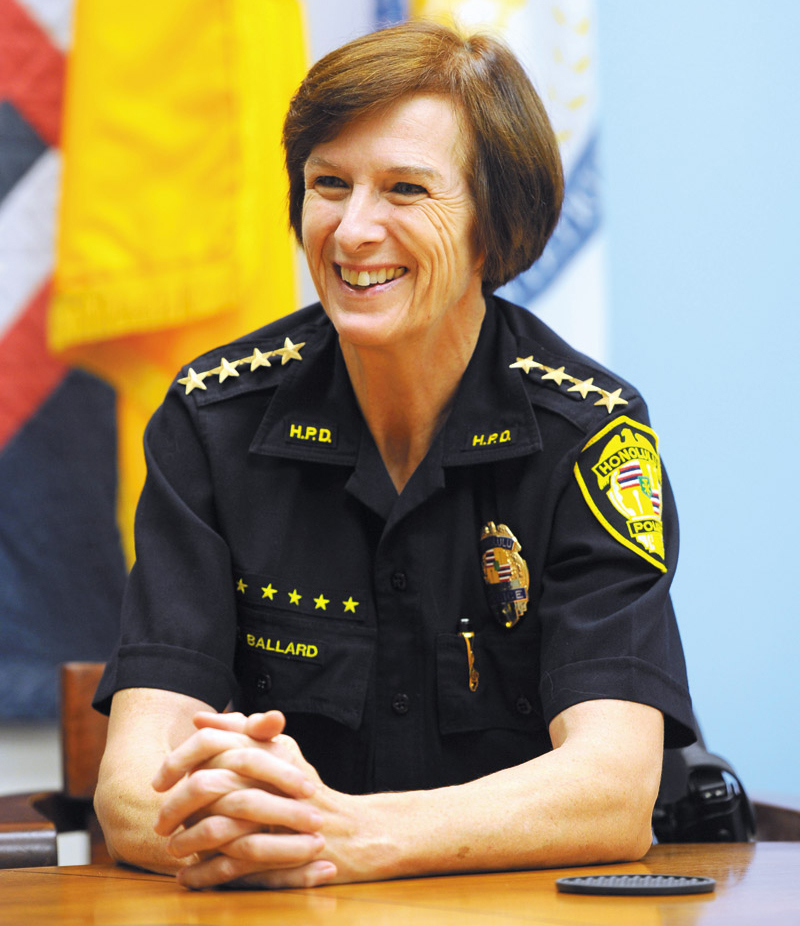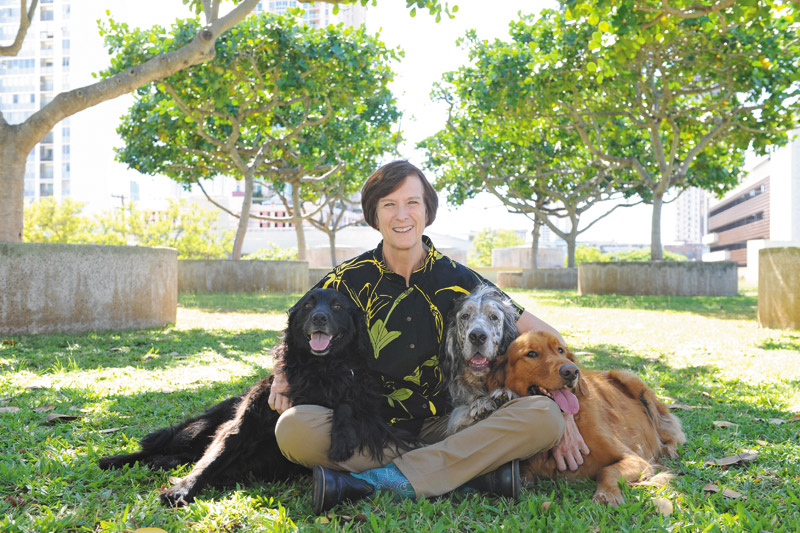The New Leader Of The Pack

Susan Ballard — shown here out on a stroll with her dogs Kona, Mango and Kai — is ready to walk the walk as Honolulu’s police chief.
Sure, the commander wears lipstick. But Susan Ballard, Honolulu’s latest police chief, is also the face of change at HPD, and highly intent on restoring public trust in the men and women in blue.
While leaders in our nation’s capitol say they want to make America great again, Susan Ballard is committed to making the Honolulu Police Department great again.
Can broken systems be restored to greatness? Once the public trust has been compromised, can credibility and community confidence be resurrected?
Yes and yes, according to Honolulu’s new police chief, who says job one is restoring public trust in the department. For a society now faced with more threats than ever before — from road rage to cyber-crimes — protecting life and property has become a ticklish process more akin to social work than chasing crooks.
The complexities of modern life are redefining municipal policing. The fabled notion of a carefree cop swinging a billy club on the corner is as outdated as resistance at having a woman at the helm of a strong police force.

Ballard moved to Hawai‘i in 1982 and three years later, following the encouragement of friends, took the HPD exam and was recruited into the department.
Kaboom! Another myth bites the dust.
Last November, Honolulu Police Commission appointed veteran major Ballard to be the first woman to hold HPD’s top job in its 85-year history. There are those who dismiss the gender distinction, not wanting to focus on the fact that the commander wears lipstick. But doing so dismisses the powerful role Ballard plays in turning the tide of one of the city’s most valued services.
Make no mistake about it: Ballard is the face of change at HPD and personifies reformation in administering public service. A 32-year veteran of the police force, it is her job to heal some internal and external disparities in the department while reconnecting with the community.
An outspoken advocate for improvements in the department, she has the support of colleagues who are anxious for the next chapter in HPD’s history. It is the reason why fellow officers encouraged her to apply for the job she had tried for twice before. She now acknowledges, “It wasn’t my time. I had more to learn.”
As a matter of fact, when the latest opportunity surfaced with the retirement of former Chief Louis Kealoha, she, too, considered retirement. The 60-year-old administrator thought it was time to turn in her badge for a life of leisure.
But younger officers, the next generation of HPD, convinced her to be a catalyst for change.
“I don’t want to let them down,” Ballard says.
Even as she reconnects with community groups, she is overwhelmed by the support being offered and the continuous chorus of well-wishers.

Ballard’s ability to get along with people and animals is one of her strongest traits.
As one citizen puts it, “She MUST succeed.”
The expectations and hopes of citizens confused and embarrassed by recent incidents of police misconduct and violations must be salved.
As one HPD employee, who requested anonymity, says, “Police are the good-conduct standard bearers of the community. A double standard destroys pride and affects our morale.”
No one knows that more than Ballard, whose three decades of HPD duty took her from the street beats of Waikīkī as a patrol officer, to progressively higher responsibilities as a sergeant and major in nearly every phase of HPD work, including training, finance, district supervision and central receiving.
At the dawn of a new year, she proclaims HPD is awakening to a “new beginning.” Her legacy could be turning the page in the annals of a police force with roots in the ancient Hawaiian kapu system and that once operated under monarchy rule.
It’s a unique heritage not to be denied and a foundation for demonstrating the greater good, she suggests.
With priorities and programs being implemented based on community polling and feedback, her team of deputies and department heads are geared for action and accountability. The “new” HPD knows the best way to improve public confidence is to be open to criticism and suggestions.
It also aspires to be more predictive and less reactive.
“My philosophy is if you don’t like what is happening, you need to be in a position to make change and make it better,” Ballard proclaims. “Don’t complain, do something about it.
“We’re going to do everything for the right reason and in the right way,” she states, even while recognizing that the nature of police work is changing with new social ills.
In a polling of districts, the top issue is the blight of homelessness. HPD is partnering with community agencies to do its part to deal with the issue.
“Project HELP addresses tactics for working with homeless populations and enforcing the law,” she reports. “We’ve sort of gotten away from community policing, but we want to bring it back in modern form.
“We’re reviewing and tearing apart our recruit curriculum at the police academy to equip officers with tools, knowledge and resources for modern situations,” she adds. “Being emphatic and more caring is as much a badge of honor today.”
Is this leadership speaking or gender emotionalism?
Experts acknowledge that women bring their own set of skills to a male-dominated culture. They tend to use wits over brawn to defuse violent situations.
Ballard affirms, “By necessity, we’ve become more social work-oriented. Officers now have to know how to deal with the mentally ill, drug addicts and domestic violence, not just law-breakers. We’re past the John Wayne image of run, gun, shoot-’em-up.”
Where does this guardian of our public safety come from? Who is she away from the rigorous demands of police work?
Ballard was born in Virginia and raised in North Carolina. Her father was a mobile home salesman, her mother a homemaker, and her sister, Lynn, was a restaurant worker who became a stockbroker.
She was educated at Tennessee Technological University with degrees in health and physical education as well as biology.
Seeking a teaching assignment, she came to Hawai‘i in 1982, “when airfare was $89 one way.” She first worked as a manager at McDonald’s-Ala Moana Center, “one of the busiest in the nation at the time.”
Later, she worked at HMSA as a fitness director and instructor.
“The office was in the basement of a building across from C.S. Wo,” Ballard recalls.
Seems she was destined to come to Beretania Street, with HPD headquarters just down the road.
“Police work wasn’t even on my radar,” she says. “But friends I met at the Central YMCA who were police officers encouraged me to take the exam. On a whim, I did and was called back to be recruited in 1985.”
The diversity and varied police tasks kept her stimulated and motivated. She found her calling.
“I get bored doing the same thing,” she admits.
She was one of the first women at the HPD police academy, Ke Kula Makai in Waipahu. Today, there are more women at the academy, although the police force is still dominated by men. In fact, only one in 10 officers on a force of 2,000 is female.
The first 60 days as HPD chief have been “uber busy,” Ballard confesses. But hitting the ground running has been made easier by not having a learning curve about the department’s culture and Honolulu’s way of life.
“It’s just another day at the office,” she says from her fourth-floor quarters. “But I still can’t believe when I approach the room that says ‘Chief of Police’ that it’s me.
“I’m just John Q. Public,” the Kailua resident adds. “I’m just your neighbor.”
Ballard is a neighbor with three lovable dogs and a cat who are “my children.” There’s Mango, an English setter; Kai, a golden retriever from Australia; Kona, a border collie-spaniel mix; and Koa Kai, a rescued blind cat.
Ballard’s likable nature reinforces her ability to get along with both people and animals.
We don’t know whether it was the holiday spirit at HPD on the day we interviewed her, but employees are cheerful and hopeful at headquarters and substations in Wai‘anae, Kailua, Kahuku, Waikīkī and Chinatown.
But there’s no denying the seriousness of the service HPD provides to our community and the human drama that officers face everyday. It’s still, as a public service campaign claims, “the dirtiest, roughest, most satisfying job in town.”
Just ask the 2,000 sworn officers and 460 civilian personnel in Ballard’s HPD ‘ohana.
But citizens have a role in maintaining an orderly and harmonious community.
“Look out for each other,” she implores. “Report any unusual or suspicious activity, so we can check it out. Be our eyes and ears.”
Beyond that, she declares, “Pay your taxes and obey the laws!”◗






